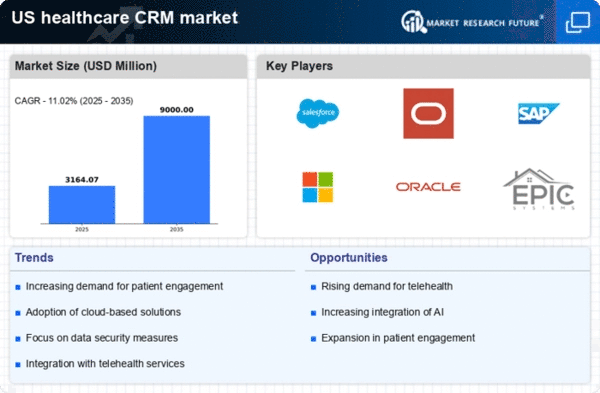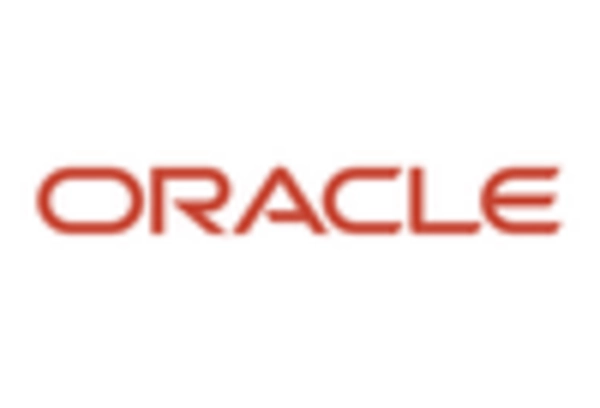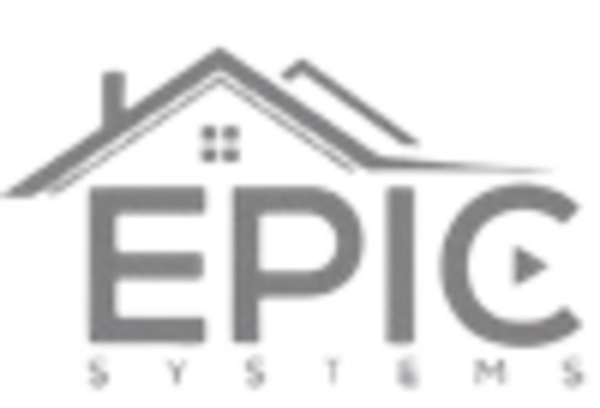Rise of Telehealth Services
The rise of telehealth services is significantly influencing the healthcare crm market, as more providers adopt digital platforms to deliver care remotely. This shift has necessitated the integration of CRM systems that effectively manage virtual patient interactions. Data suggests that telehealth usage has surged, with over 40% of patients in the US utilizing these services in recent months. Consequently, healthcare organizations are increasingly seeking CRM solutions that can support telehealth functionalities, such as appointment scheduling, follow-up reminders, and patient engagement tools. This trend is likely to drive growth in the healthcare crm market as providers adapt to the evolving landscape of healthcare delivery.
Integration of Advanced Analytics
The integration of advanced analytics into the healthcare crm market is becoming increasingly prevalent, as organizations strive to leverage data for improved decision-making. By utilizing analytics, healthcare providers can gain insights into patient behavior, treatment outcomes, and operational efficiency. This capability allows for more effective marketing strategies and resource allocation. Recent statistics indicate that healthcare organizations that employ analytics-driven CRM solutions report a 25% increase in patient retention rates. As the demand for data-driven insights continues to rise, the healthcare crm market is likely to expand, with providers seeking to adopt systems that offer robust analytical capabilities.
Increased Focus on Operational Efficiency
The healthcare crm market is witnessing a heightened focus on operational efficiency, as organizations strive to streamline processes and reduce costs. By implementing CRM systems, healthcare providers can automate administrative tasks, enhance workflow management, and improve patient communication. Recent findings indicate that organizations utilizing CRM solutions experience a 30% reduction in operational costs. This emphasis on efficiency is likely to continue, as healthcare providers seek to optimize their operations in a competitive environment. As a result, the healthcare crm market is expected to grow, driven by the demand for solutions that enhance productivity and reduce overhead.
Regulatory Compliance and Data Management
Regulatory compliance remains a critical driver in the healthcare crm market, as organizations must navigate complex legal frameworks governing patient data. The Health Insurance Portability and Accountability Act (HIPAA) mandates strict guidelines for data protection, compelling healthcare providers to adopt CRM systems that ensure compliance. As of November 2025, approximately 60% of healthcare organizations have reported challenges in managing compliance effectively. This has led to an increased investment in CRM solutions that offer built-in compliance features, thereby enhancing data security and management. The focus on regulatory adherence is expected to propel the healthcare crm market as organizations prioritize systems that mitigate compliance risks.
Growing Demand for Patient-Centric Solutions
The healthcare crm market is experiencing a notable shift towards patient-centric solutions, driven by the increasing demand for personalized care. Healthcare providers are recognizing the importance of understanding patient needs and preferences, which has led to the integration of CRM systems that facilitate better communication and engagement. According to recent data, approximately 70% of healthcare organizations in the US are investing in CRM technologies to enhance patient experience. This trend is likely to continue as patients increasingly expect tailored services and proactive communication from their healthcare providers. Consequently, the healthcare crm market is poised for growth as organizations seek to implement solutions that prioritize patient satisfaction and loyalty.
















